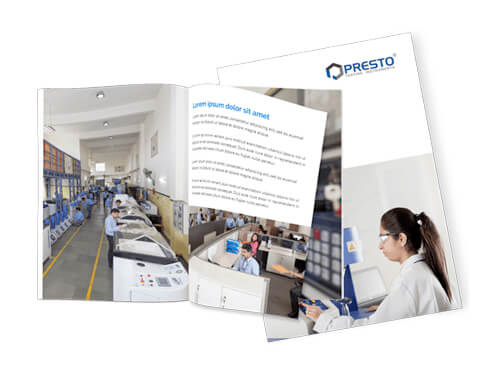Unleashing the Power of Precision: Presto’s Tensile Strength Tester
.png)
Gaurav Malhotra
16-07-2024
Tensile strength testers or Universal testing machines are mainly employed in engineering. They are devices that assess how materials react under tension, providing essential insights. It is key to material testing and has a unique way of checking the load that any material can withhold.
Exploring Tensile Strength Testers
A Tensile strength tester, or UTM, checks how much load a material can withstand before yielding under stressful conditions. This functionality helps analyze important mechanical properties of different substances - including rubber, textiles, and composite items.
Applications of tensile strength testers span a wide range of critical functions in both industrial and research settings:
Evaluating materials: UTMs are critical in assessing various mechanical properties such as tensile strength, yield strength, modulus of elasticity, and elongation.
This data helps researchers select materials for specific purposes. It also ensures meeting and exceeding standards of quality.
Quality Control: The tensile strength tester is integral to comply with standards of quality. For example, especially in the aerospace/automotive sectors, tensile strength assessment is very crucial for testing materials applicable here.
Innovation and/or Optimization: These instruments are essential in guiding innovation and fine-tuning product designs by checking new designs, prototypes, and formulations. Engineers leverage insights gained from tensile tests to iterate designs, enhance product performance, and optimize manufacturing processes for superior reliability and efficiency.
Other Applications of Tensile Strength Testers
Automotive Sector: this instrument plays a crucial role in assessing the tensile strength of automotive parts. This testing ensures that international and national standards of quality are maintained.
Construction Industry: Tensile strength testing is vital to evaluate the performance of construction materials such as concrete, steel reinforcements or rebars, and structural composites. Engineers employ this instrument to comply with safety and regulatory requirements in construction projects.
Medical Field: As tensile strength tester supplier we understand how instrumental this equipment is in evaluating the tensile properties of biomaterials. Whether they are used in medical implants, prosthetics, or surgical instruments. This ensures that medical devices can endure physiological stresses while maintaining structural integrity throughout their lifespan.
Calibration of Tensile Strength:
Calibration is required to ensure the consistency of tensile strength test results. Key features of calibrating include:
Load Cell Calibration: load cells are used to exert the force of the specimen during testing. Regular calibration of load cells enables accurate force measurement and uniformity in test results. At Presto, a load cell calibration facility is provided to ensure precision testing.
Crosshead Speed Calibration: The rate at which the crosshead travels during testing influences the strain rate. This therefore impacts the material's tensile qualities. Calibration of crosshead speed settings ensures consistent testing results.
Grip Alignment and Calibration: Proper alignment is necessary to ensure accurate results. There are different types of grips, used to hold the specimen, prevent slippage and ensure consistent stress distribution. This is crucial for accurately determining tensile strength and deformation properties.
FAQS:
Q 1: How does tensile strength testing affect material selection and design optimization?
ANSWER 1) Tensile strength testing provides manufacturers and designers with critical information regarding a material's ability to withstand force. This knowledge is essential, to ensure that the materials selected fulfill specified performance criteria. To ensure that product longevity and reliability are maintained, this test must be conducted.
Q 2: What advantages can UTMs provide over other testing methods?
ANSWER 2) UTMs have various advantages over other testing methods, including impact and hardness tests. Unlike impact tests, which assess a material's resistance to rapid pressure, tensile strength testing offers information about material behavior under slow and controlled loading circumstances.
Q3: What is the importance of sample preparation?
ANSWER 3) Sample preparation plays a pivotal role in ensuring the precision and reliability of tensile strength testing. Preparation of specimens by standardized protocols outlined in ASTM or ISO standards is necessary to ensure accurate test results
Want to know the tensile strength tester price?
Contact us at +91 9210903903. For further queries, you can mail us at info@prestogroup.com.
Recent News
- Paper & Packaging Testing Instruments
- Paint, Plating & Coating Testing Instruments
- Plastic & Polymer Testing Instruments
- Environmental Testing Chambers
- PET & Preform Testing Instruments
- Color Measuring Testing Instruments
- View Entire Range Instruments

Catalogue 2023
Get information about new product launches, research, innovation and endeavors at Presto.
download Free CopyNeed more information
Connect with us for your business enquiries. Generally we respond within one or two working days.
send enquiriesContact Us
Get a Quote
